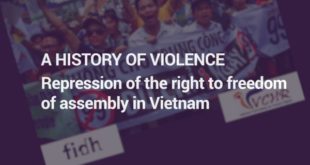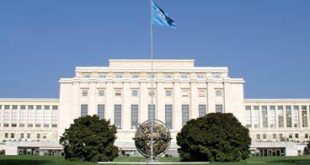Head of the Institute for the Dissemination
of the Dharma (Viện Hóa Đạo)
Unified Buddhist Church of Vietnam
Venerable Thich Vien Dinh, secular name Nhu Van Trung, was born on 8 July 1951 in Chanh Trach hamlet, My Tho village, Phu My district in the central province of Binh Dinh. He was brought up with a traditional Confucian education, in a devout Buddhist family who had followed Buddhism for several generations. Thich Vien Dinh was the third of six children. His great grand-father founded the Bao Chau Pagoda, built by the villagers in the forest near his hamlet. His father and uncle, who worked for the government of the former Republic of (South) Vietnam, were both murdered by the communists at their homes in 1962. His mother later became a nun and lived at the Giac Hoa Pagoda with Thich Vien Dinh until she died in 1991.
In 1960, Thich Vien Dinh entered the Buddhist orders. His master was Thich Ke Chau, Superior monk of Bao Chau and Bau Son pagodas which belonged to the Thap Thap school of Buddhism. In 1965, Thich Ke Chau became Superior monk of the Thap Thap Pagoda, the principle temple of the Thap Thap school. He was a staunch supporter of the Unified Buddhist Church of Vietnam (UBCV), and in 1995 he launched an “Open Letter No. 9” to the communist authorities signed by all the monks in Binh Dinh province, calling for the release of the detained UBCV leader Thich Huyen Quang. The letter stated: “What a humiliation for Vietnamese Buddhism – pagodas have become prisons to detain Buddhist monks!”
The Thap Thap Pagoda is one of the oldest and most impressive temples in Central Vietnam, founded in the XVII century by the Patriarch Nguyen Thieu. In 1920, Patriarch Phuoc Hue, who also held the title of Great monk and Merit Teacher of the Nation, opened the countrys first Buddhist classes in Thap Thap Pagoda. In 1929, Patriarch Phuoc Hue went to Hue to lecture at the Truc Lam Buddhist Academy, forming a brilliant generation of Buddhists monks and lay-followers who deeply marked contemporary and modern Vietnamese Buddhism, such as the late Most Venerable Thich Don Hau, Thich Chanh Thong, Thich Mat Nguyen, Thich Mat Hien, Thich Ke Chau, the outstanding Buddhist layman Tam Minh Le Dinh Tham etc. Patriarch Phuoc Hue was one of the great figures of Vietnamese Buddhism, and one of the leaders of the Buddhist renaissance movement in the 1920s. The Kings Thanh Thai, Duy Tan and Khai Dinh regularly invited him to the Palace to teach Buddhism. He was thus given the title of Great monk and Merit Teacher of the Nation, and received royal recognition of his position as Patriarch of the Thap Thap school.
In 1963, Thich Vien Dinh went to school at the Thua Thien school of Buddhism in Hue.
In 1968, he returned to Qui Nhon to continue his studies. After obtaining his baccalaureate, he went on to study at the Van Hanh Buddhist University in Saigon.
In 1973, he was ordained Bikkhu at the Hai Duc Great Ordainment Ceremony in Nha Trang.
In 1975, he became Superior monk of the Giac Hoa Pagoda in Saigon.
In 1976, he was appointed UBCV Commissioner for Youth in Binh Thanh Ward, Saigon.
In 1993, he renovated and expanded the Giac Hoa Pagoda to provide a centre for monks and novices studying Buddhism.
In 1994, his Master Thich Ke Chau summoned him to Binh Dinh. Before an assembly of the order of monks, he appointed Thich Vien Dinh as his successor as Superior monk of the Thap Thap Pagoda, and entrusted him with its renovation.
In 1996, his Master Thich Ke Chau and his mentor Thich Quang Thac, both accomplished masters of martial arts, talented writers and erudite scholars, died peacefully together on the same day, 5th day of the 12th month in the year of the Pig (January 1996), one at 6.00am and one at midnight. This extraordinary event is not uncommon for Buddhist masters of exceptional virtue.
In 2003, the UBCV Institute for the Dissemination of the Dharma appointed Thich Vien Dinh to assist Most Venerable Thich Huyen Quang and Thich Quang Do in organizing the UBCVs Extraordinary Congress at the Nguyen Thieu Monastery in Binh Dinh. This Congress marked a new era in the movement to reestablish the legal status of the outlawed UBCV and win human rights, democracy and freedom for Vietnam. For the first time since 1975, after 28 years of unabated repression and banning of its activities, the UBCV chose a new leadership for the Institute of the Sangha and the Institute for the Dissemination of the Dharma, with 41 new appointees.
On 1st October 2003, at the UBCV Extraordinary Congress, Thich Vien Dinh was appointed Deputy Head of the UBCVs Institute for the Dissemination of the Dharma (Viện Hóa Đạo).
On 9th October 2003, Thich Vien Dinh was arrested at Luong Son in Khanh Hoa province along with a delegation of senior monks from the new UBCV leadership as they left the Congress. He was forcibly escorted back to Saigon and placed under arrest at the Security Police station in Binh Thanh Ward, Saigon. He remained under house arrest for the next three years.
In 2005, Thich Vien Dinh was appointed Secretary-general as well as Deputy Head of the UBCV Institute for the Dissemination of the Dharma. He established the UBCVs secretariat at the Giac Hoa Pagoda.
For the past thirty six years, against a backdrop of anti-Buddhist repression, moral crisis, increasing poverty and social inequity, Thich Vien Dinh has faced up to all challenges and spared no efforts to support UBCV leaders Thich Huyen Quang and Thich Quang Do in their efforts to re-establish the UBCVs legal status and advocate human rights and democratic freedoms in Vietnam. He has also made invaluable contributions to improving the conditions and opportunities for all those seeking to study and practice Buddhism in Vietnam.
 Quê Me Quê Me: Action for democracy in Vietnam & Vietnam Committee on Human Rights
Quê Me Quê Me: Action for democracy in Vietnam & Vietnam Committee on Human Rights


